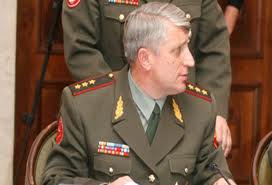
Can Anyone Save the Russian Defense Industry?
Publication: Eurasia Daily Monitor Volume: 8 Issue: 194
By:

In what might be called his presidential campaign speeches, Prime Minister Vladimir Putin has promised that within a decade a three trillion ruble ($95.18 billion) modernization program will completely rearm the entire military as well as make Russia a paragon of global growth, science and innovation (Svobodnaya Pressa, September 26). Similarly the Commander-in-Chief of the Ground Forces, Colonel-General Aleksandr Postnikov, says that Russia will renew its pool of military hardware and weapons by 70 percent by 2020 (Zvezda Television, September 29).
However, when one looks at the real state of affairs in the defense industrial sector as well as overall state procurement it becomes clear that such promises are but another farcical echo of earlier Soviet invocations of the radiant future. As Putin himself observed, only the stage of placing of state orders is currently regulated at present, and even this is insufficiently regulated. Meanwhile, the number and volume of non-competitive (and both corrupt and predatory) practices are increasing while more and more contracts are concluded with a sole contractor. As a result, there is no oversight mechanism for the implementation of contracts in science, education, the health sector, and the purchase of “complex hardware,” as well as in the defense sector leading to what Putin calls “ludicrous cases” (Rossiya 24, September 29). Typically, the Russian leader demands reform that will make the federal contracts system an efficient instrument of state policy and an instrument for raising the efficiency of state spending and modernizing the overall economy (Rossiya 24, September 29).
But there is still no plan for reform of this jungle of corrupt practices; and in any case, Putin’s re-emergence as president and the end to any serious talk of economic and political modernization that will expectedly accompany this return make clear that little will be accomplished. The Chief of the General Staff, Army-General Nikolai Makarov, has made clear that Russia retains a need to continue buying Western technologies despite formidable political domestic opposition from the usual suspects and their political protectors – what Khrushchev once called the steel or metal eaters (Russian Defense Policy, September 12). But despite prodigious outlays – 67 billion rubles ($2.16 billion) in loan guarantees to defense enterprises – this sector is still unable to compete (Rosbalt, September 16).
In many cases the defense ministry and producers are at loggerheads with the manufacturers, refusing to produce the small number of systems the ministry demands because of inability to justify the cost. Thus, for example the defense ministry wants to buy four to six engines annually for the TU-160 supersonic bomber’s NK-32 engine, whereas the Amalgamated Engine-Building Corporation, part of Samara’s Kuznetsov Open Joint-Stock company, maintains that to recoup production costs it must build at least 20 engines per year. Thus, the system may not be built and the only supersonic bomber capable of penetrating the US air defense system, currently a high priority, may be grounded (Izvestiya, September 16).
Meanwhile pervasive corruption, not least in the areas singled out by Putin (such as procurement and contract violations), is occurring even in the Strategic Missile Troops (Interfax-AVN, September 19). Or if that is not the case, in many other instances it turns out that substantial changes in the ministry’s policies were devised without any evaluation of the consequences they would entail for defense industry (Saratov Bizness Konsalting, August 2). This is not the only problem at the top of the procurement chain. Putin, and his subordinates still adhere to the Stalinist notion that the “expanded state defense order is among the critical instruments of modernization of both the defense industry and the entire Russian economy,” suggesting they have learned little since Stalin (Interfax, September 24). Yet, a recent article by Ruslan Pukhov makes clear that Tupolev’s efforts to develop unmanned aerial vehicles (UAVs) are largely useless for contemporary military missions. Given all these problems, Tupolev may be forced out of the military sector and, as we saw, not only for UAVs. Clearly Sukhoi and MiG have performed much better at meeting current challenges but, as the two examples of Tupolev’s problems show, this is not enough (Nezavisimoye Voyennoye Obozreniye, September 16).
Moreover, even the firms that succeed are clearly highly implicated in corrupt and predatory practices; it cannot be otherwise, given the nature of the system, because the problem is not corruption as such. Rather corruption, as Dmitry Simes wrote some time ago, is the system. Typically, Putin demands more regulations and controls. But anyone familiar with the mores and history of Russian bureaucracy knows this demand amounts to a dog chasing its tail and is futile if not largely for show. Neither is throwing money at the problem an answer since that only increases the opportunities for and rewards of corruption. Putin is promising reform as well as economic pie in the sky, but these promises are literally incredible. While it may take a village to raise a child in Africa, it will take a miracle to straighten out this sector and the entire sector of state contracting between now and whenever Putin decides to retire from his next presidency.




